
Click to jump down to a section:
Our Fight for a Livable Wage
Our Fight for a Just Workplace and Protections for International GSWs
Our Fight for a Livable Wage
USC Graduate Student Workers perform critical teaching and research labor for USC, teaching thousands of students and bringing in billions of dollars in research grant money — a figure that stands at $2.6 billion as of 2021. According to USC’s 2022 Financial Report and USC administration’s own numbers on Graduate School spending, USC’s spending on Graduate Student Worker funding packages (~$144 million) accounted for less than 2.5% of annual university expenditures (~$5.96 billion) in 2022.
And yet, we Graduate Student Workers are struggling to pay the bills, forced to withstand the skyrocketing cost of living in LA on a meager stipend below the living wage. The fight for a livable wage animated Graduate Student Workers’ years-long efforts to form a union and drove our 93% union election win back in February, and it’s a top priority at the bargaining table.
Here’s where things stand at the bargaining table, as of October 31st:
USC Administration Proposal (as of 11/21) | GSWOC-UAW Proposal (as of 11/21) |
No wage supplement for this year | Wage supplement this year that provides GSWs with needed relief |
Unacceptably low stipend increases that do not meaningfully address cost-of-living concerns | Significant stipend increases that address cost-of-living concerns |
Unacceptably low stipend increases through 2026-27 | Steady stipend increases through 2026-27 that would provide raises each year to match or outpace inflation |
Livability
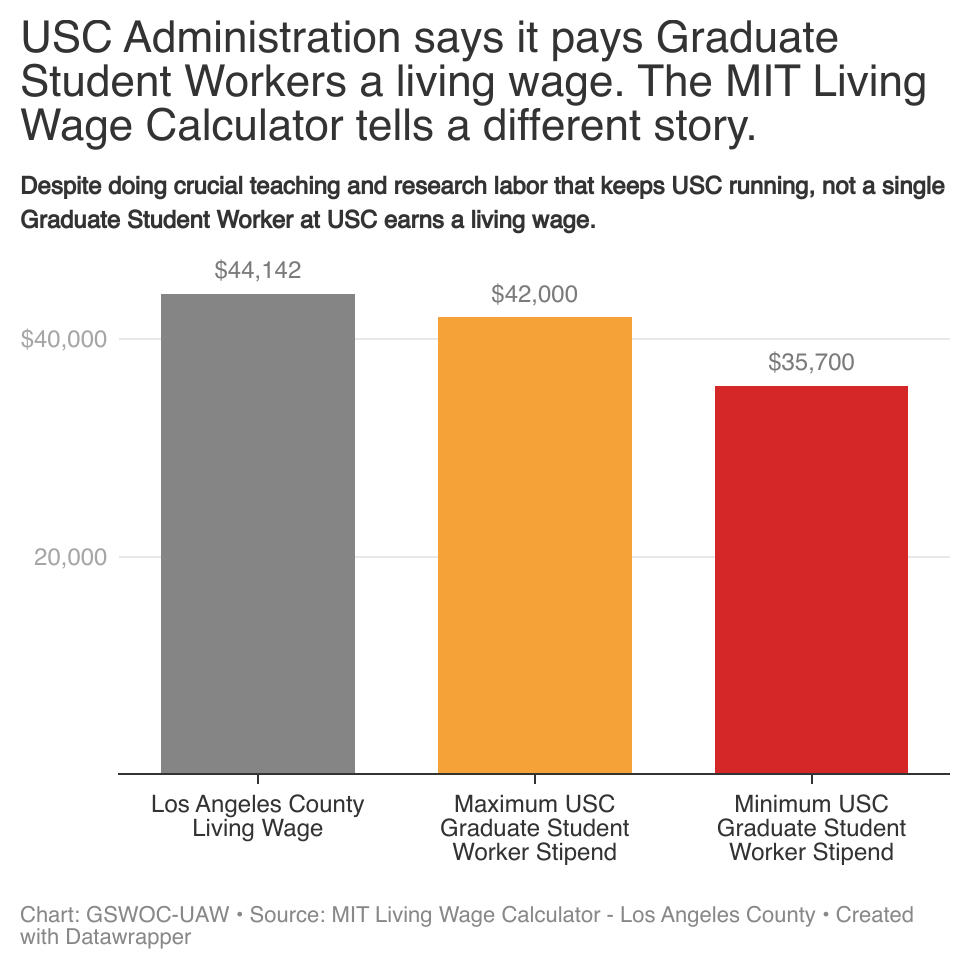
USC’s Graduate Student Worker stipend is not a living wage. The MIT Living Wage Calculator calculates the current LA County living wage to be $44,142. For those taking care of dependents, the living wage line is far higher.
USC administration is well-aware that not a single GSW earns a living wage, and yet has consistently offered proposals that fail to meaningfully increase wages toward a livable standard.
The cost-of-living crisis at USC is urgent. 88% of GSWs are rent-burdened, and the average GSW spends 54% of our paycheck on housing.
Pre-tax take-home pay for GSWs who are paid the 12-month minimum stipend is $2,975 monthly. After taxes, GSWs barely make more than $2,000 per month — not remotely enough to live on.
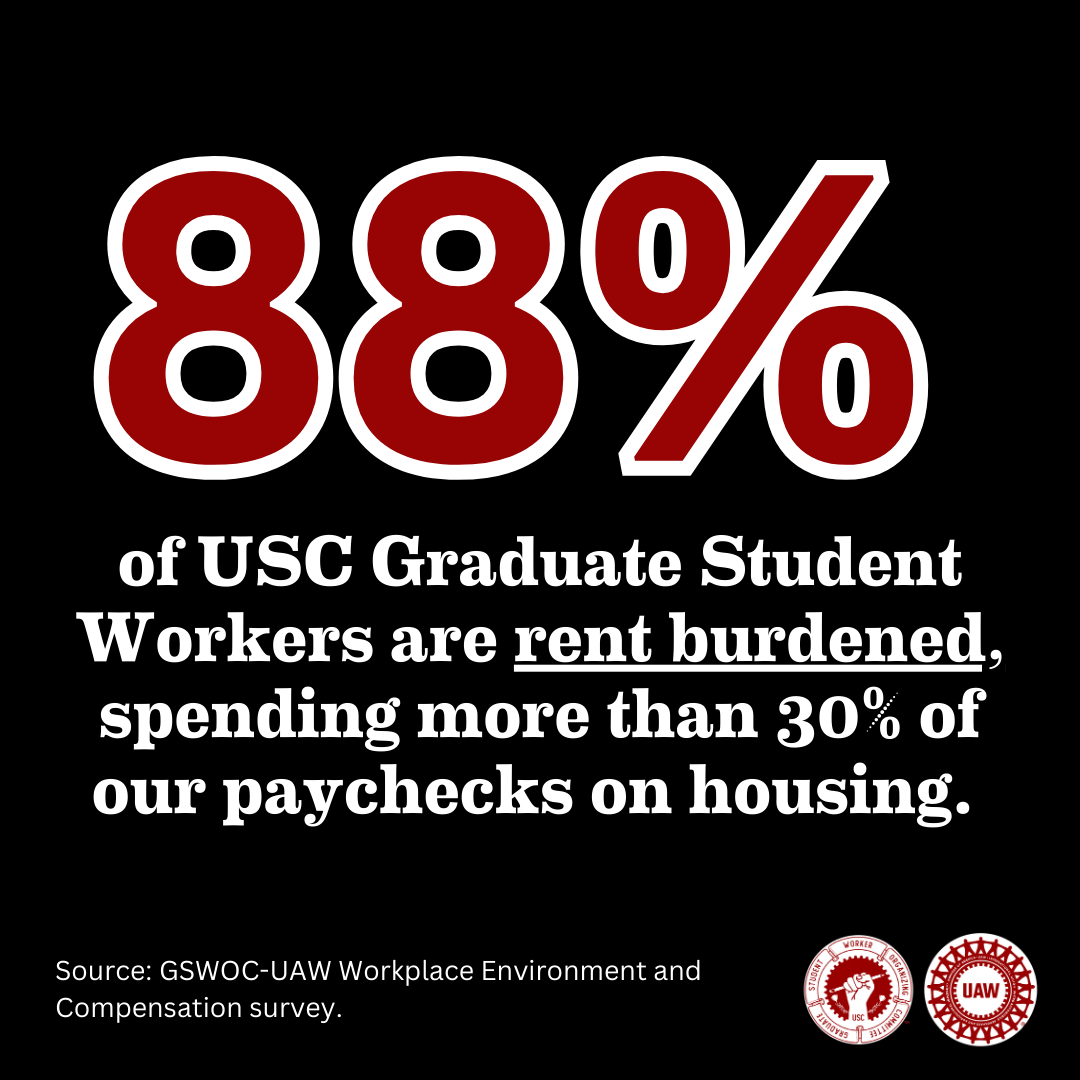
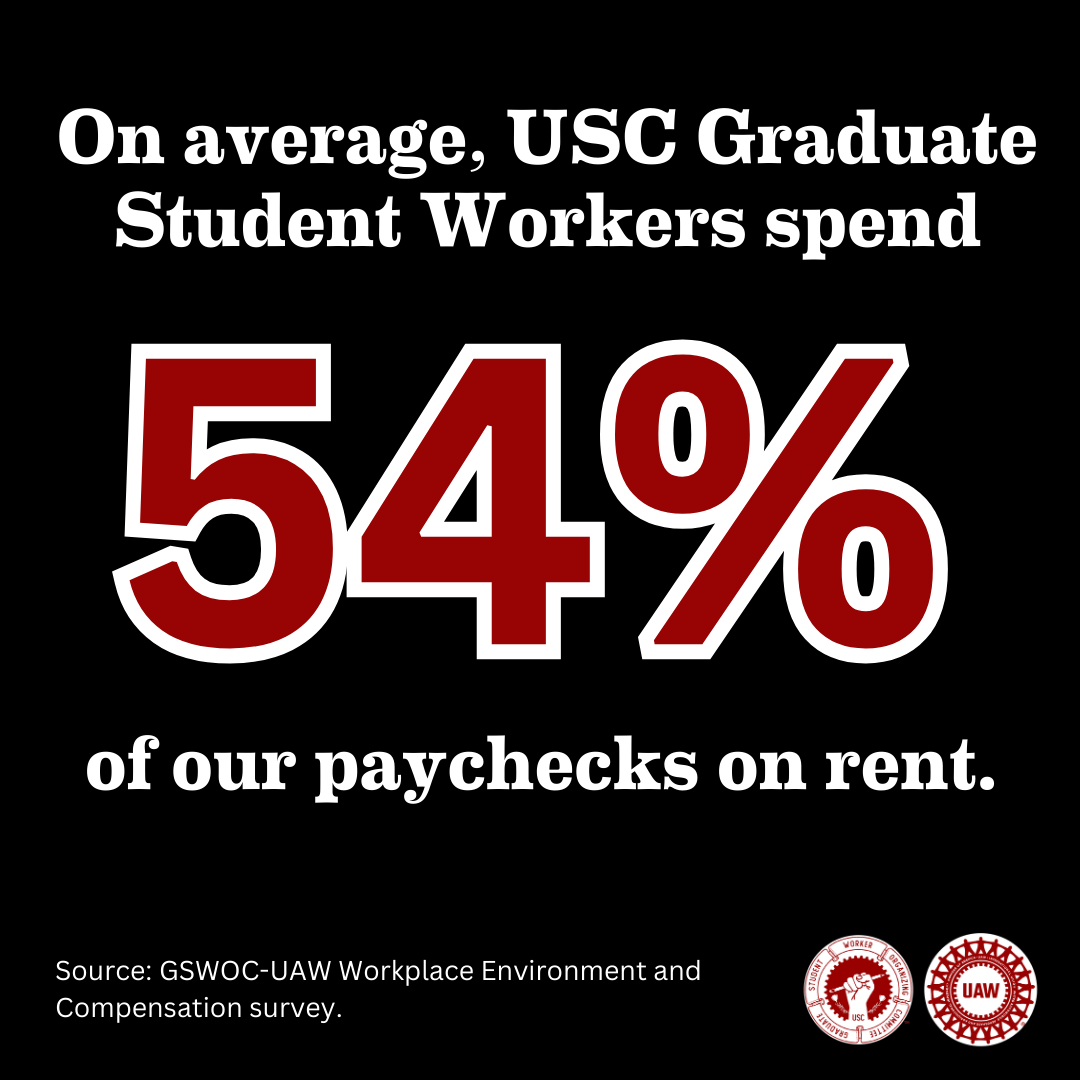
Inflation in LA has been brutal for USC Graduate Student Workers. A brief look at the USC Graduate School minimum stipend reveals that, taking into account the rising cost of living, GSWs have seen a steady wage decrease since 2018 – the start of USC’s 4-year wage freeze.
Meanwhile, USC administrators have seen hefty raises over the past five years. USC President Carol Folt received a base pay raise of over $1 million between 2021 and 2022 (from $2.3 million to $3.5 million annually) – a raise northward of 48%.
Graduate Student Workers’ low, declining wages have grave implications for equity. Doing a PhD at USC has become increasingly difficult for those who don’t have access to generational wealth or support from family. To make USC a more equitable institution, where researchers of all backgrounds can afford to work and study, USC administration needs to agree to a fair and livable wage.
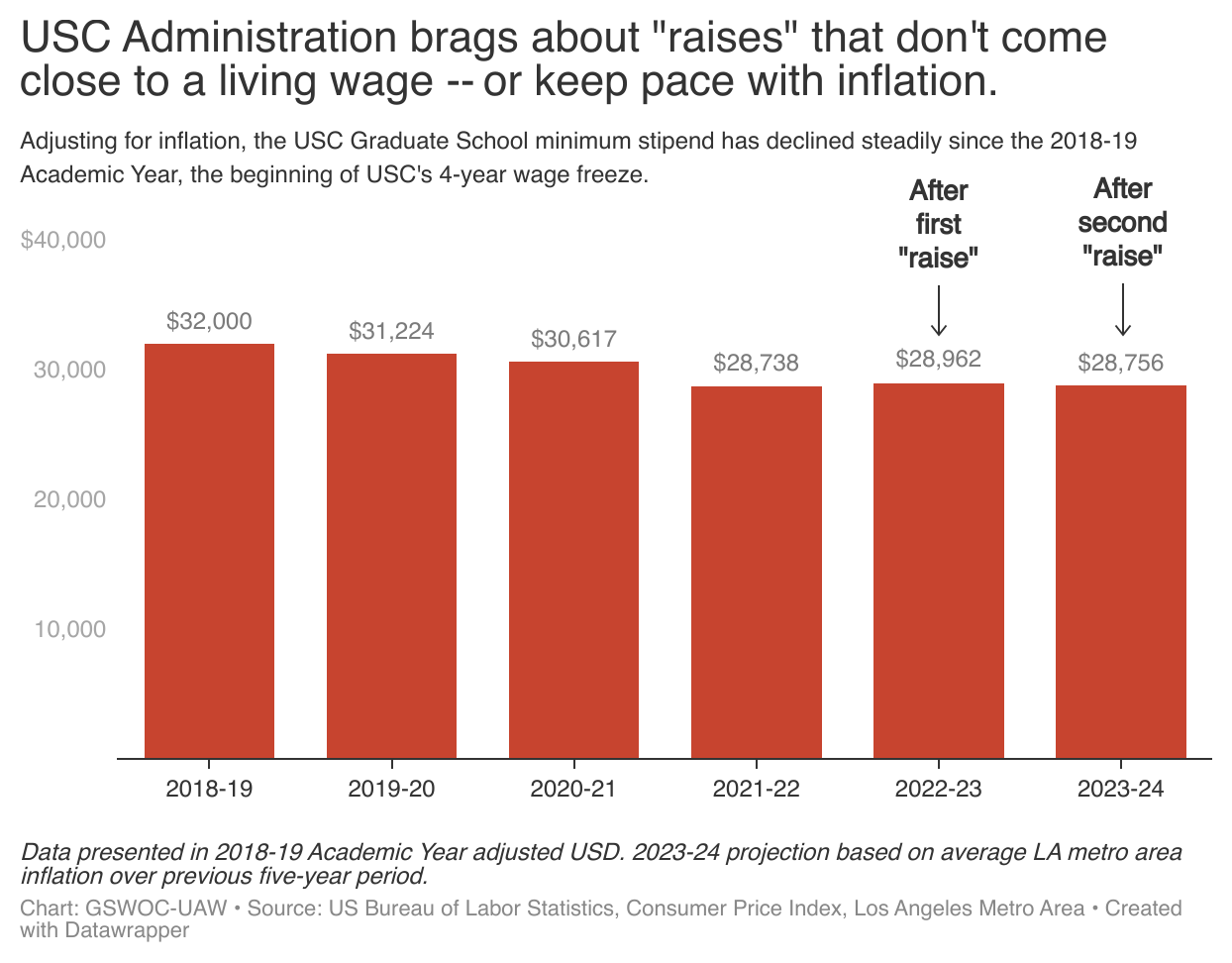
USC administration’s claim that GSWs’ proposals are “fiscally impractical” rings hollow. This is USC we’re talking about — the same institution paying a football coach a reported $11 million per year. A GSW in the Chemistry Department doing cancer research would have to work for 308 years to make as much as Lincoln Riley makes in one year. For context, during the November 13th bargaining session, USC administration complained that Graduate Student Workers’ current proposal would cost USC $10 million this year.
USC administration’s messaging isn’t fooling anyone. Everyone — from Graduate Student Workers to elected officials, to the general public — knows that USC has the resources to pay workers a livable wage.
It’s not only that USC administration can pay us Graduate Student Workers more, but that they should. By investing in the workers, USC can invest in its own financial security. It’s important to remember that grant funding doesn’t go directly to the workers doing the research; in fact, a majority of every grant goes directly to USC for “overhead.” The $2.6 billion in grant money that USC GSWs have helped secure for this year and future years doesn’t just support graduate education and research; it supports the entire University and helps pay USC administrators’ sky-high salaries. Beyond just keeping the lights on in labs and classrooms, USC GSWs provide immense monetary value for the entire university.
Competitiveness
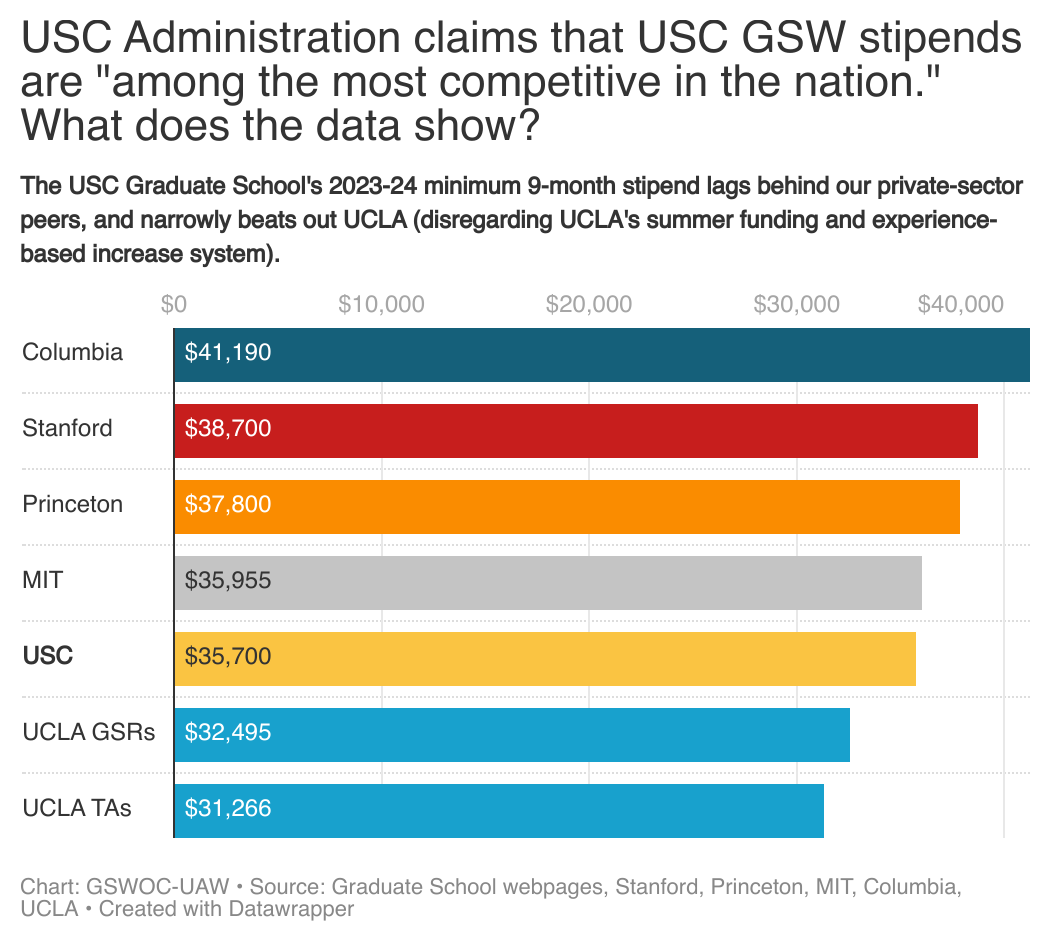
USC Administration has repeatedly claimed that the Graduate School stipend is “among the most competitive in the nation.” The data shows that this is plainly untrue.
No matter how you slice it, USC’s stipend is not “among the most competitive in the nation,” as USC administration claims. It’s not even particularly competitive with USC’s stated peers.
The minimum 9-month stipend, $35,700, lags well-behind Stanford and Columbia. Even UCLA, ostensibly behind USC on this metric, offers a more competitive wage overall. Summer funding at USC is known to be less common and less generous than at UCLA. It’s also much easier for Graduate Student Workers at UCLA to advance above the minimum than at USC.
For example, a UCLA TA on a 9-month appointment moves up to an annual wage of $35,795 after just nine months of teaching. At USC, no such experience-based system exists, and Graduate Student Workers typically remain stuck at the minimum level.
Starting next year, UCLA TAs on a 9-month appointment with nine months of teaching experience will earn $41,787 annually. Under USC admin’s current proposals, the same TA would make just $37,000 next year.
USC 12-month minimum stipend is much easier to compare. When we compared USC’s 2023-24 minimum 12-month stipends to peer institutions, we found that USC’s fell far short. 12 months of work at Stanford, Princeton, Columbia, MIT, and UCLA pays substantially more than 12 months of work at USC.
Even USC Graduate Student Workers making above the 12-month minimum do not earn a truly competitive or livable stipend. According to a national tracker of Computer Science PhD stipends, USC’s Computer Science Stipend, $42,000, ranks a mere 18th in the nation, behind many of USC’s competitors such as Stanford, the University of Chicago, and MIT.
When adjusted for cost of living, USC falls to 23rd in the country. You don’t need a Computer Science degree to know that “among the most competitive in the nation” is a bit of a stretch.
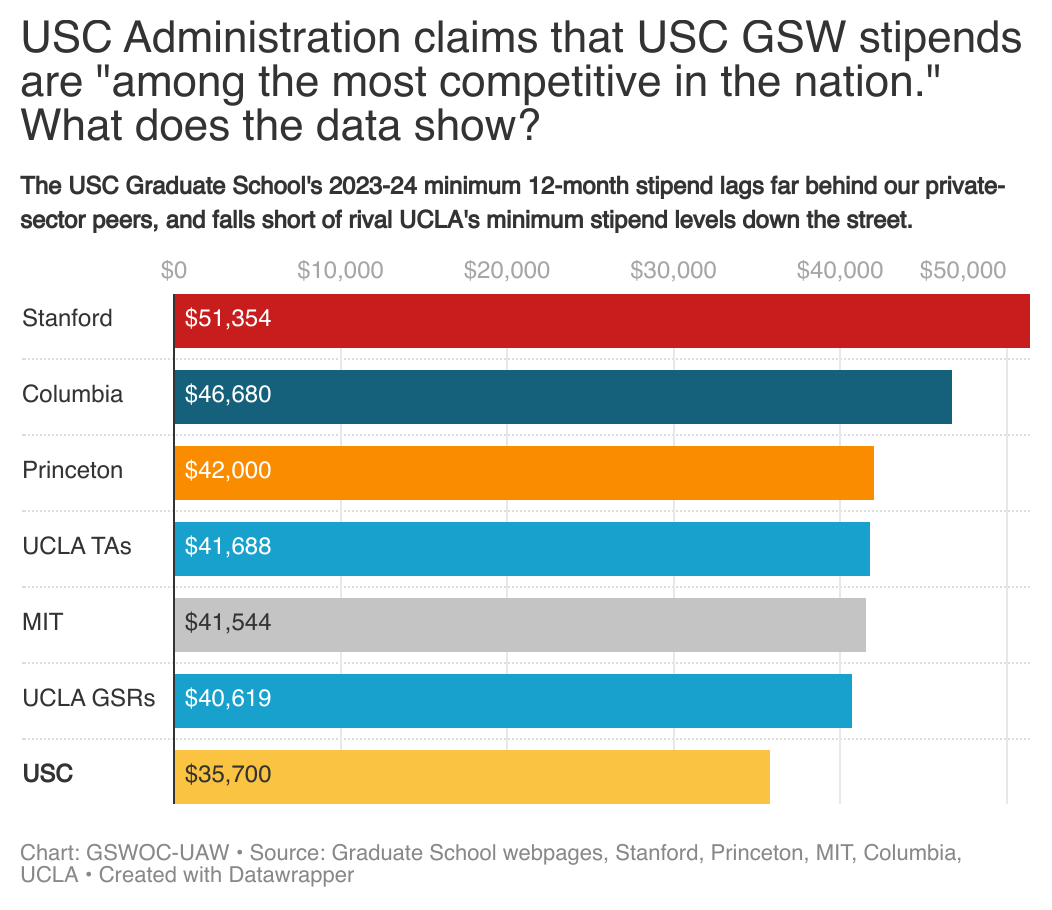
The only path forward to a fair contract is for USC administration to come to the table with fair offers. If they don’t, thousands of Graduate Student Workers are prepared to walk off the job for a livable, competitive stipend that keeps up with LA’s rising cost of living.
Our Fight for a Just Workplace and Protections for International GSWs
Winning real protections against workplace abuse was a major part of why Graduate Student Workers formed a union, and it’s a top priority for us at the bargaining table.
Unfortunately, as of November 21st, USC has maintained their unacceptable position that protections from harassment and discrimination should be carved out of the grievance process and unenforceable under the contract. USC admin’s position is that virtually everything should be grievable under the contract except for workplace abuse. This indefensible proposal would disempower Graduate Student Workers – particularly international students – from coming forward when we experience workplace abuse.
Strong language in the Immigration Tentative Agreement and Nondiscrimination proposal would give International GSWs unprecedented protections against discriminatory behavior based on visa status that results in termination or discipline. Without enforceable protections, however, this language barely changes the status quo.
Read the Op-Ed
International GSWs outline why we demand strong, grievable protections against discrimination, bullying, and harassment!
Kayla Love, a 4th-year PhD Candidate in the Chemistry Department, experienced blatant pregnancy discrimination when she tried to take a parental leave — and @USC denied her any recourse.
Kayla is one of countless workers who has undergone pregnancy discrimination @USC.🧵(part 1) pic.twitter.com/ltYTJYfAIA
— GSWOC-UAW USC (@gswocusc) November 20, 2023
Yongqin, an international PhD student in the Electrical and Computer Engineering Department at USC, knows firsthand the struggles international students face when it comes to harassment and bullying on the job. 🧵 pic.twitter.com/oPHcvOjOYC
— GSWOC-UAW USC (@gswocusc) November 15, 2023
USC Administration Proposal (as of 11/22) | GSWOC-UAW Proposal (as of 11/22) |
Enforceability of harassment and discrimination protections under USC admin’s control | Harassment and discrimination protections subject to the full grievance process, GSWs can enforce our rights under the contract |
Protections from harassment and discrimination not arbitrable until after the Title IX process ends | Protections from harassment and discrimination subject to independent arbitration |
No guaranteed reasonable timelines; USC admin can delay the Title IX process without independent accountability | Real enforcement mechanisms for clear, reasonable timelines |
By proposing a system where GSWs cannot enforce our workplace protections under our union contract and through independent arbitration, USC administration is telling GSWs that our right to a just workplace isn’t a priority for them – and that they’d rather uphold the status quo, where major delays and coverups continue without outside accountability.
We GSWs know that real recourse for survivors would mean a stronger USC – with fewer damaging USC scandals. Enormous settlements are one of USC’s most costly line items. The Tyndall settlement alone could cover every single GSW’s current funding package for nearly eight full academic years.
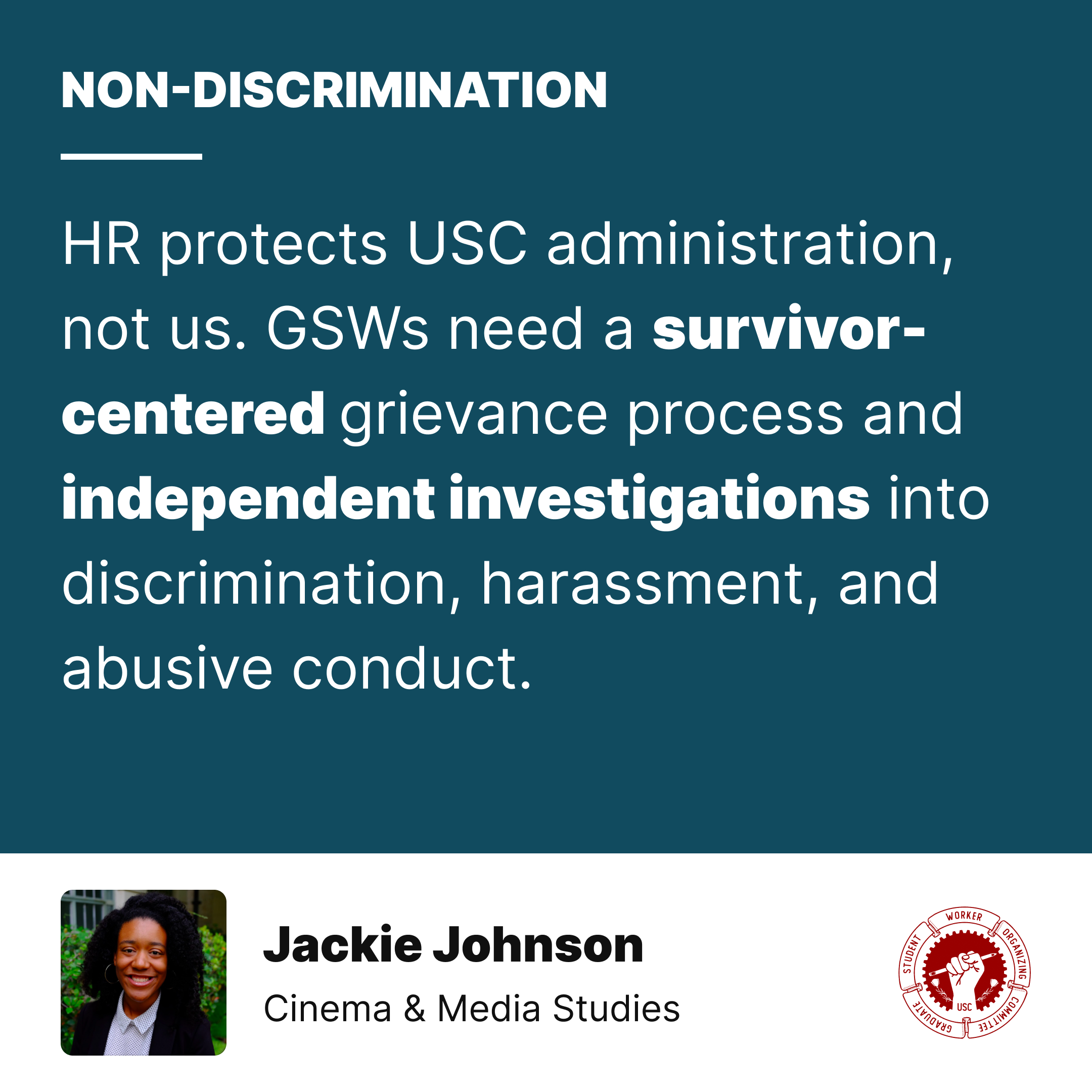
We — all of us GSWs — know that academia in general and USC in particular are not equitable nor safe places for all of us. Graduate-level education in the US has many issues, with rates of harassment second only to the military, precarious immigration rules that keep international students from speaking up against abuses and create unequal burdens, and countless wealth- and race-based barriers to entry.
FACT:
UCLA, the University of Washington, NYU, and the New School all have independent arbitration for survivors of workplace abuse. USC GSWs just want the same protections as our peers!
Read the Op-Ed
Electrical and Computer Engineering Graduate Student Workers on why they demand a strong union and a just workplace!
Here at USC, we’re all likely familiar with the long, unfortunate history of USC administration covering up abuse. Further, many of us have personal stories of either experiencing or witnessing workplace harassment, discrimination, or bullying — without any real recourse. It’s clear that we Graduate Student Workers rightly lack faith in USC’s internal processes when such instances of bullying, harassment, and discrimination do occur: the GSWOC Workplace Climate Survey found that 3 out of 4 GSWs lack faith in the resolution process.
The fundamental distrust that USC’s broken internal processes have created keeps countless survivors from coming forward and traps countless GSWs in a toxic culture of silence and intimidation.
Graduate Student Workers at USC are united in demanding real recourse in the form of arbitrable protections for survivors. Over 1,500 GSWs signed the United for Workplace Justice letter, which called for USC to drop its carve-out for workplace abuse, and over 300 GSWs hand-delivered the letter to USC administration at the United for Workplace Justice rally on August 31st, where LA City Councilwoman Nithya Raman gave a powerful speech in support of the Union’s demands.
